Ginger, scientifically known as Zingiber officinale, is a flowering plant that has been valued for centuries for its culinary and medicinal properties. Beyond its distinctive flavor, ginger offers a plethora of health benefits that have captivated the interest of researchers and health enthusiasts alike. In this article, we delve into the various ways ginger can positively impact our well-being.
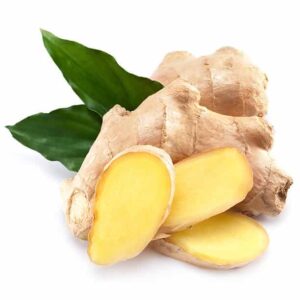
Enhanced Digestion and Gut Health
Ginger aids in digestion by stimulating the production of digestive enzymes, promoting smooth muscle contractions in the gastrointestinal tract, and reducing inflammation in the gut. It can alleviate symptoms of indigestion, bloating, and stomach discomfort, making it an excellent natural remedy for digestive woes.
Furthermore, ginger possesses unique compounds such as gingerol, which has been found to have anti-inflammatory and antioxidant properties. These properties not only soothe the digestive system but also protect it from oxidative stress and damage caused by free radicals. Additionally, ginger has been shown to help regulate the movement of food through the digestive tract, preventing constipation and promoting regularity.
Moreover, ginger can also aid in the management of gastrointestinal discomfort associated with conditions like irritable bowel syndrome (IBS) and dyspepsia. Its ability to calm the stomach and reduce inflammation can provide relief from symptoms such as abdominal pain, cramping, and irregular bowel movements. By supporting overall gut health, ginger contributes to improved digestion and enhances nutrient absorption, ensuring that the body receives essential vitamins and minerals efficiently.
 Anti-Inflammatory Powerhouse
Anti-Inflammatory Powerhouse
Ginger contains potent anti-inflammatory compounds, including gingerols and shogaols, which help combat chronic inflammation. Regular consumption of ginger has been associated with reduced inflammation markers and may provide relief from conditions like arthritis, inflammatory bowel disease, and cardiovascular diseases.
Ginger’s anti-inflammatory prowess extends beyond its components like gingerols and shogaols. Its unique combination of bioactive compounds and antioxidants contributes to its powerful anti-inflammatory effects. One notable feature of ginger is its ability to inhibit the production of pro-inflammatory cytokines, molecules that play a key role in promoting inflammation in the body. By modulating these cytokines, ginger helps regulate the inflammatory response, potentially providing relief for individuals suffering from various inflammatory conditions.
Moreover, ginger possesses properties that can target multiple pathways involved in inflammation. For instance, it has been found to suppress the activity of certain enzymes that promote inflammation, such as cyclooxygenase (COX) and lipoxygenase (LOX). This dual inhibition of COX and LOX pathways is similar to the mechanism of action of nonsteroidal anti-inflammatory drugs (NSAIDs), albeit without the associated side effects commonly seen with these medications.
Additionally, ginger’s anti-inflammatory effects are not limited to a specific area of the body. Whether consumed as a spice in culinary dishes, brewed into tea, or taken in supplement form, ginger’s bioactive compounds can exert systemic anti-inflammatory effects, reaching various tissues and organs throughout the body. This widespread impact makes ginger a versatile and accessible option for individuals seeking natural remedies to alleviate inflammation and its associated symptoms.
 Nausea Relief
Nausea Relief
Ginger’s antiemetic properties make it a trusted remedy for combating nausea and vomiting. Whether it’s motion sickness, morning sickness during pregnancy, or post-operative nausea, ginger can effectively alleviate these symptoms. Ginger capsules, tea, or ginger-infused foods are commonly used for this purpose.
Ginger’s effectiveness in relieving nausea stems from its ability to influence several physiological processes. One key mechanism is its impact on the gastrointestinal tract, where it helps to relax the smooth muscles and ease digestion. This action can soothe the stomach and alleviate the sensation of queasiness. Additionally, ginger contains compounds like gingerol and shogaol, which possess anti-inflammatory properties. By reducing inflammation in the stomach lining, ginger can further alleviate symptoms of nausea and discomfort.
Furthermore, ginger’s versatility allows it to be incorporated into various forms, catering to individual preferences and needs. Whether consumed as a hot cup of ginger tea, conveniently taken in the form of capsules, or enjoyed as part of a flavorful meal, ginger offers flexibility in its administration. This adaptability makes it accessible and convenient for individuals seeking relief from nausea across different contexts and lifestyles.
Moreover, ginger’s natural composition makes it a safer alternative to some conventional anti-nausea medications, particularly for pregnant individuals experiencing morning sickness. Unlike certain pharmaceutical options, ginger typically poses fewer risks of adverse effects and is generally well-tolerated. Its mild yet effective nature provides reassurance to those seeking relief without the concern of harsh side effects.
 Immune System Support
Immune System Support
With its immune-boosting properties, ginger can fortify your body’s natural defenses. Its antioxidants and bioactive compounds help combat free radicals, protect against infections, and reduce the risk of chronic diseases. Incorporating ginger into your diet can provide an extra shield for your immune system.
Additionally, ginger has been found to stimulate certain immune cells, such as macrophages and T-cells, which play crucial roles in identifying and destroying pathogens within the body. These immune-boosting effects of ginger can enhance the body’s ability to mount a robust defense against invading viruses, bacteria, and other harmful microorganisms.
Furthermore, ginger has been traditionally used in various natural remedies to alleviate symptoms of respiratory infections, such as colds and flu. Its warming properties can help soothe sore throats, clear congestion, and promote expectoration, thereby supporting the body’s respiratory health. By maintaining the health of the respiratory system, ginger contributes to overall immune resilience, helping the body fend off respiratory infections more effectively.
Moreover, ginger contains potent anti-inflammatory properties that can help alleviate inflammation in the body, which is often a key component of immune system dysfunction. Chronic inflammation can weaken the immune response, making the body more susceptible to illness and disease. By reducing inflammation, ginger can help optimize the functioning of the immune system.
 Potential Anti-Cancer Properties
Potential Anti-Cancer Properties
Research suggests that ginger may possess anti-cancer properties due to its bioactive compounds. Studies have shown that ginger extracts can inhibit the growth of certain cancer cells and reduce inflammation associated with cancer development. However, further research is needed to fully understand the mechanisms and potential applications.
Furthermore, ginger’s potential anti-cancer properties are attributed to its rich content of bioactive compounds such as gingerol, paradol, and shogaol. These compounds possess antioxidant and anti-inflammatory properties that play a crucial role in combating cancerous cells and inhibiting tumor growth. Gingerol, in particular, has been extensively studied for its ability to induce apoptosis, or programmed cell death, in cancer cells, thereby halting their proliferation.
Moreover, ginger exhibits selective cytotoxicity towards cancer cells while sparing normal, healthy cells—a characteristic that is highly desirable in cancer treatment. This selective toxicity minimizes the adverse effects commonly associated with traditional chemotherapy, making ginger a promising candidate for adjunctive or alternative cancer therapies.
In addition to its direct effects on cancer cells, ginger also demonstrates potential in enhancing the efficacy of conventional cancer treatments. Studies have shown that ginger extracts can sensitize cancer cells to chemotherapy and radiation therapy, thereby increasing their susceptibility to treatment-induced cell death. This synergistic effect not only improves the overall therapeutic outcome but also reduces the dosage of conventional treatments required, mitigating their side effects.
 Blood Sugar Regulation
Blood Sugar Regulation
Ginger has shown promise in managing blood sugar levels and improving insulin sensitivity. It may help regulate glucose metabolism and reduce the risk of developing type 2 diabetes. Individuals with diabetes should consult with healthcare professionals to determine the appropriate use of ginger as part of their management plan.
In addition to its potential in managing blood sugar levels and enhancing insulin sensitivity, ginger possesses unique properties that make it a promising addition to dietary interventions for diabetes management. One notable aspect is its ability to inhibit enzymes involved in carbohydrate metabolism, which can help slow down the absorption of glucose in the bloodstream. This effect may contribute to more stable blood sugar levels, reducing the risk of sudden spikes and crashes commonly observed in individuals with diabetes.
Furthermore, research suggests that ginger may play a role in improving lipid metabolism, which is closely intertwined with blood sugar regulation. High levels of circulating lipids, such as cholesterol and triglycerides, are commonly observed in individuals with diabetes and can exacerbate cardiovascular risk. Ginger has been shown to reduce levels of total cholesterol, LDL cholesterol (the “bad” cholesterol), and triglycerides, while increasing levels of HDL cholesterol (the “good” cholesterol”). This lipid-modulating effect, in conjunction with its impact on glucose metabolism, underscores the potential of ginger as a comprehensive therapeutic agent for managing diabetes and its comorbidities.
Improved Brain Function and Mental Health
Ginger’s bioactive compounds may have positive effects on brain health and cognitive function. Research suggests that ginger’s antioxidants and anti-inflammatory properties can protect against age-related cognitive decline and support mental well-being. It may also help alleviate symptoms of anxiety and depression, although more studies are needed to establish the extent of its benefits.
In addition to its antioxidant and anti-inflammatory properties, ginger contains several unique bioactive compounds that contribute to its potential benefits for brain function and mental health. One such compound is gingerol, which has been shown to have neuroprotective effects by reducing oxidative stress and inflammation in the brain. These actions may help safeguard neurons from damage and promote overall cognitive function.
Furthermore, ginger’s potential to alleviate symptoms of anxiety and depression may be attributed to its interaction with serotonin receptors in the brain. Some research suggests that certain constituents of ginger may modulate serotonin levels, which play a crucial role in regulating mood and emotional well-being.
Cardiovascular Health
Studies have indicated that ginger may have a positive impact on cardiovascular health. Its anti-inflammatory and antioxidant properties help reduce oxidative stress and inflammation in the arteries, potentially lowering the risk of heart disease and improving overall heart health. Ginger’s ability to lower cholesterol and blood pressure levels further contributes to its cardiovascular benefits.
Ginger’s unique properties make it a promising natural remedy for cardiovascular health. One notable aspect is its ability to enhance blood circulation by promoting vasodilation, which relaxes the muscles in blood vessel walls and allows for smoother blood flow. This effect not only reduces strain on the heart but also helps prevent the formation of blood clots, which can lead to serious cardiovascular events like heart attacks or strokes.
Moreover, ginger has been shown to modulate lipid metabolism, specifically targeting triglyceride levels. High triglyceride levels are often associated with an increased risk of atherosclerosis and coronary artery disease. By regulating these lipid levels, ginger can help maintain the integrity of blood vessels and prevent plaque buildup, thus safeguarding against the development of cardiovascular diseases.
Additionally, ginger exhibits antiplatelet activity, meaning it can inhibit the aggregation of platelets in the blood. Platelet aggregation plays a crucial role in the formation of blood clots, particularly in narrowed or damaged blood vessels. By preventing excessive platelet aggregation, ginger reduces the likelihood of thrombotic events, further protecting cardiovascular health.
Respiratory Support
Ginger’s warming properties and natural compounds can provide relief from respiratory ailments such as coughs, colds, and congestion. It may help soothe the throat, reduce coughing, and loosen mucus, making it a popular ingredient in herbal remedies for respiratory health.
Ginger has been utilized for centuries in traditional medicine systems like Ayurveda and Traditional Chinese Medicine for its potent therapeutic properties. Its active components, such as gingerol, shogaol, and zingerone, contribute to its anti-inflammatory, antimicrobial, and antioxidative effects, which are particularly beneficial for respiratory health.
One of the unique aspects of ginger is its ability to modulate the immune response. By exerting immunomodulatory effects, ginger can help regulate the body’s immune system, potentially reducing the severity and duration of respiratory infections. This property makes it a valuable addition to herbal formulations aimed at supporting the body’s defense mechanisms against pathogens.
Moreover, ginger’s warming nature stimulates circulation throughout the body, including the respiratory system. Improved circulation can enhance oxygenation of tissues and promote the clearance of toxins, aiding in the resolution of respiratory issues. Additionally, this increased circulation may help alleviate symptoms such as chest tightness and shortness of breath, providing comfort to individuals with respiratory conditions.
In traditional herbal medicine, ginger is often combined with other herbs and botanicals known for their respiratory-supportive properties, such as licorice, eucalyptus, and peppermint. These synergistic combinations can amplify the benefits of ginger, creating comprehensive formulas that address various aspects of respiratory health, from soothing inflamed airways to promoting expectoration of mucus.
Weight Management
Including ginger in a balanced diet and healthy lifestyle may aid in weight management. Ginger’s thermogenic properties can boost metabolism and increase fat burning. Additionally, ginger’s ability to suppress appetite and promote satiety may help reduce calorie intake and support weight loss efforts.
Moreover, ginger may aid digestion, another crucial aspect of weight management. By promoting better digestion, ginger can help prevent bloating and discomfort, allowing for more efficient nutrient absorption. This can indirectly support weight management by optimizing the body’s ability to utilize nutrients from food effectively.
Furthermore, ginger contains compounds like gingerol and shogaol, which have been studied for their potential to improve insulin sensitivity. Better insulin sensitivity means that cells are more responsive to insulin, the hormone responsible for regulating blood sugar levels. Improved insulin sensitivity can help prevent spikes and crashes in blood sugar levels, which can contribute to cravings and overeating.
Anti-Aging Effects
Ginger’s antioxidant properties help fight oxidative stress and free radicals, which are known to contribute to aging. By reducing cellular damage, ginger may help promote youthful-looking skin and slow down the aging process.
One of its key components, gingerol, possesses anti-inflammatory properties that can help reduce inflammation in the body. Chronic inflammation is linked to various age-related conditions such as arthritis, heart disease, and neurodegenerative diseases. By mitigating inflammation, ginger may contribute to overall health and longevity.
Moreover, ginger contains compounds that can promote collagen production. Collagen is a protein that provides structure to the skin, helping it maintain elasticity and firmness. As we age, collagen production naturally declines, leading to sagging skin and the formation of wrinkles. By stimulating collagen synthesis, ginger may help improve skin elasticity and reduce the appearance of fine lines and wrinkles, thus promoting a more youthful complexion.
Additionally, ginger has been found to possess antibacterial and antifungal properties, which can be beneficial for maintaining skin health. By fighting off harmful bacteria and fungi, ginger may help prevent skin infections and breakouts, further supporting its anti-aging effects.
Improved Nutrient Absorption
Ginger can enhance the absorption of essential nutrients, particularly in the digestive system. It aids in the breakdown of nutrients and promotes their efficient utilization by the body, ensuring optimal nutrient absorption.
Furthermore, Ginger possesses bioactive compounds such as gingerol and shogaol, which stimulate the secretion of digestive enzymes that aid in the breakdown of food particles. These enzymes help to catalyze the digestion process, ensuring that nutrients are broken down into simpler forms for easier absorption. Moreover, ginger has been shown to modulate gut microbiota, promoting a healthy balance of beneficial bacteria in the gut. This favorable microbial environment further supports efficient nutrient absorption by facilitating the breakdown of complex nutrients into absorbable components.
Oral Health
Ginger’s antimicrobial properties extend to oral health as well. It may help fight oral bacteria, reduce inflammation in the gums, and promote fresher breath. Incorporating ginger into oral hygiene routines can contribute to overall dental health.
Ginger’s unique properties make it a valuable addition to oral health practices. Its anti-inflammatory effects can alleviate discomfort associated with oral conditions such as gingivitis and periodontitis. Additionally, ginger’s natural analgesic properties may provide relief from toothaches and oral sores.
Moreover, ginger contains compounds like gingerol and shogaol, which exhibit powerful antioxidant effects. These compounds can help protect oral tissues from oxidative stress and damage caused by free radicals, thus potentially reducing the risk of oral diseases and promoting overall gum health.
Incorporating ginger into oral care routines can be as simple as incorporating it into homemade toothpaste or mouthwash recipes, or even chewing on a small piece of fresh ginger root. However, it’s essential to note that while ginger can complement conventional oral hygiene practices, it should not replace them entirely. Regular brushing, flossing, and dental check-ups remain crucial for maintaining optimal oral health.
Enhanced Exercise Performance and Recovery
Ginger’s anti-inflammatory effects and ability to reduce muscle soreness make it beneficial for athletes and individuals engaged in regular exercise. Consuming ginger before or after physical activity may help improve performance, decrease inflammation, and enhance post-workout recovery.
Additionally, ginger exhibits thermogenic properties, which can boost metabolism and increase calorie expenditure during exercise. This not only aids in weight management but also enhances endurance and stamina during prolonged physical activity. Furthermore, ginger has been shown to improve digestion and nutrient absorption, ensuring that athletes derive maximum benefits from the nutrients in their diet to support their performance and recovery.
Moreover, ginger contains potent antioxidants such as gingerol, which help combat oxidative stress induced by intense exercise. By neutralizing free radicals and reducing oxidative damage to cells and tissues, ginger contributes to overall health and reduces the risk of exercise-related injuries. Its anti-nausea properties can also be beneficial for individuals prone to exercise-induced nausea or gastrointestinal discomfort.
Stress Relief
Ginger’s calming properties can help reduce stress and promote relaxation. Its aroma and compounds may have a soothing effect on the nervous system, making ginger a potential natural remedy for stress management.
Ginger’s stress-relieving properties stem from its active compounds, particularly gingerol and zingerone, which have been shown to have anti-inflammatory and antioxidant effects. These compounds can help in combating oxidative stress in the body, which is often associated with chronic stress and its negative impacts on overall health.
Moreover, ginger can also aid in alleviating symptoms commonly associated with stress, such as nausea and digestive discomfort. By promoting healthy digestion and soothing the gastrointestinal tract, ginger can contribute to a sense of well-being and relaxation. Its ability to reduce nausea and vomiting has been well-documented, making it a valuable natural remedy for those experiencing stress-induced gastrointestinal issues.
Furthermore, the versatility of ginger allows it to be incorporated into various forms, such as teas, infusions, or added to meals and snacks. This accessibility makes it convenient for individuals to incorporate ginger into their daily routines as part of their stress management strategies. Whether consumed as a warm cup of ginger tea during moments of relaxation or infused into a nourishing meal, ginger offers a holistic approach to stress relief that addresses both physical and emotional well-being.
Nutritional value per 100g of ginger
- Calories: 80 kcal
- Protein: 1.82 grams
- Fat: 0.75 grams
- Saturated Fat: 0.203 grams
- Monounsaturated Fat: 0.159 grams
- Polyunsaturated Fat: 0.267 grams
- Carbohydrates: 17.77 grams
- Dietary Fiber: 2 grams
- Sugars: 1.7 grams
- Vitamins:
- Vitamin C: 5 milligrams
- Vitamin B6: 0.16 milligrams
- Vitamin E: 0.26 milligrams
- Minerals:
- Calcium: 16 milligrams
- Iron: 0.6 milligrams
- Magnesium: 43 milligrams
- Phosphorus: 34 milligrams
- Potassium: 415 milligrams
- Sodium: 13 milligrams
- Zinc: 0.34 milligrams
- Copper: 0.226 milligrams
- Other:
- Water: 78.89 grams
These values may vary slightly depending on factors such as variety, growing conditions, and freshness. However, they provide a general overview of the nutritional composition of ginger per 100 grams.
Conclusion
Ginger’s remarkable benefits extend beyond what meets the eye. From anti-aging effects and improved blood circulation to menstrual pain relief and stress reduction, ginger continues to impress with its wide-ranging health-enhancing properties. Whether enjoyed in culinary dishes, infused in beverages, or taken as a supplement, ginger can be a valuable addition to your wellness routine, supporting your overall health and vitality.
 Delicate and flavorful, Steamed Fish with Ginger is a classic dish in many Asian cuisines, celebrated for its simplicity and exquisite taste. This recipe combines tender white fish fillets with the subtle warmth of ginger, creating a harmonious blend of flavors that is both comforting and satisfying. Steaming preserves the natural juiciness and freshness of the fish while allowing the ginger-infused aromas to permeate every bite. Whether served as a light lunch or as part of an elegant dinner spread, this dish is sure to delight your taste buds and leave you craving more.
Delicate and flavorful, Steamed Fish with Ginger is a classic dish in many Asian cuisines, celebrated for its simplicity and exquisite taste. This recipe combines tender white fish fillets with the subtle warmth of ginger, creating a harmonious blend of flavors that is both comforting and satisfying. Steaming preserves the natural juiciness and freshness of the fish while allowing the ginger-infused aromas to permeate every bite. Whether served as a light lunch or as part of an elegant dinner spread, this dish is sure to delight your taste buds and leave you craving more.
Contraindications for ginger consumption
- Medication Interactions:
Ginger may interact with certain medications, including blood thinners (such as warfarin), antiplatelet drugs, and antacids. It is important to consult with a healthcare professional if you are taking any medications to ensure there are no potential interactions.
- Bleeding Disorders:
Ginger has natural blood-thinning properties, which can increase the risk of bleeding. Individuals with bleeding disorders or those preparing for surgery should avoid consuming excessive amounts of ginger or use it with caution.
- Gallbladder Issues:
If you have a history of gallstones or any other gallbladder issues, it is advisable to consult with a healthcare professional before consuming ginger, as it may stimulate the gallbladder and exacerbate symptoms.
- Pregnancy Complications:
While ginger is generally considered safe for pregnant women, high doses may have potential effects on pregnancy. It is recommended to consult with a healthcare professional before using ginger supplements or consuming large amounts of ginger during pregnancy.
- Allergies:
Some individuals may have allergic reactions to ginger. If you have a known allergy to ginger or other related plants (such as turmeric), it is best to avoid ginger consumption or use it with caution.
- Stomach Ulcers:
Ginger may stimulate gastric acid secretion, which can exacerbate symptoms in individuals with stomach ulcers or acid reflux. If you have these conditions, it is advisable to monitor your response to ginger consumption and consult with a healthcare professional.
- Diabetes:
Ginger may lower blood sugar levels, so individuals with diabetes or those taking medications to control blood sugar levels should monitor their blood glucose levels closely and consult with a healthcare professional before incorporating ginger into their diet.
Fascinating Facts About Ginger
Ginger as a Natural Insect Repellent:
While most people are familiar with ginger’s culinary and medicinal uses, few know that it can also serve as a natural insect repellent. The pungent aroma of ginger essential oil can deter pests like mosquitoes, making it a fragrant and eco-friendly alternative to chemical insect repellents.
Ginger’s Musical Roots:
In some cultures, ginger has unexpected musical applications. In the Caribbean, particularly in Trinidad and Tobago, dried ginger rhizomes are used as “rattles” in traditional musical performances called “steelpan” bands. The dried ginger pieces create a distinctive sound when shaken, adding a unique percussion element to the music.
Ginger’s Cosmetic Charms:
Beyond its culinary and medicinal uses, ginger also boasts beauty benefits. Ginger extract is a common ingredient in skincare products due to its antioxidant and anti-inflammatory properties, which can help soothe and rejuvenate the skin. Additionally, ginger’s warming properties are believed to promote healthy blood circulation when applied topically, giving the skin a radiant glow.
Ginger’s Symbolic Significance:
In certain cultures, ginger holds symbolic significance beyond its culinary value. In Japan, for example, ginger is associated with purification and is often included as a component of ritual cleansing baths. Similarly, in some Eastern European traditions, ginger is believed to ward off evil spirits and bring good luck when hung as a charm in the home.
Ginger’s Lunar Connection:
In astrology and folklore, ginger is linked to the planet Mars and the element of fire, attributing it with qualities of passion, vitality, and courage. Some astrologers believe that incorporating ginger into one’s diet or rituals during Mars-ruled periods can enhance energy levels and assertiveness.
Ginger’s Magnetic Charm:
Ginger possesses a unique magnetic property known as “paramagnetism,” which means it is weakly attracted to magnetic fields. While not strong enough to be used in conventional magnetic applications, this quirky characteristic adds to ginger’s mystique and makes it a subject of fascination for scientists and curious minds alike.
Ginger’s Culinary Contrasts:
In addition to its traditional savory and sweet applications, ginger can also lend its unique flavor to unexpected culinary creations. For instance, in certain parts of the world, ginger is used to add a spicy kick to savory meat dishes like lamb or venison, creating a tantalizing fusion of flavors that surprises and delights the palate.
Ginger’s Time-Tested Tradition:
Throughout history, ginger has been associated with various superstitions and folklore. In medieval Europe, it was believed that ginger could be used to ward off the plague, leading to its widespread use as a protective charm during times of epidemic. Similarly, in ancient Egypt, ginger was prized for its purported aphrodisiac properties and was often included in love potions and rituals.
Ginger’s Ice Cream Adventure:
While ginger is commonly used in desserts like gingerbread and cookies, its use in ice cream might come as a surprise. However, ginger ice cream is a delightful treat enjoyed in many parts of the world, offering a refreshing and slightly spicy twist on the classic frozen dessert.
Ginger’s Bubbling Brews:
In medieval Europe, ginger was a key ingredient in a curious concoction known as “ginger beer,” which was not the carbonated beverage we know today. Instead, it was a fermented alcoholic drink made from ginger, sugar, water, and sometimes lemon juice or yeast. This spicy libation was enjoyed for its effervescence and invigorating flavor, offering a unique alternative to traditional ale or mead.
Ginger’s Magnetic Moment:
In a fascinating twist, recent scientific research has revealed that ginger possesses a weak magnetic property known as “paramagnetism.” While this magnetic effect is too subtle to be detected in everyday situations, it adds an intriguing dimension to ginger’s allure and continues to pique the interest of scientists studying its magnetic properties.
Ginger’s Floral Surprise:
While most people are familiar with ginger’s spicy flavor and aroma, few may realize that certain varieties of ginger produce beautiful and fragrant flowers. These delicate blooms, which range in color from white and yellow to pink and red, add a touch of exotic beauty to gardens and tropical landscapes where ginger plants thrive.
Ginger’s Zoological Connection:
Ginger’s name has an unexpected zoological origin—it’s derived from the Sanskrit word “srngaveram,” which means “horn-shaped,” referring to the shape of ginger’s rhizomes. This botanical curiosity gave rise to the term “ginger,” which has since become synonymous with the spicy root and its culinary and medicinal uses.
Ginger’s Adventurous Roots:
Ginger plants are resilient explorers, capable of thriving in diverse ecosystems and even colonizing new territories. In some regions, ginger has escaped cultivation and established itself as an invasive species, spreading rapidly and outcompeting native vegetation. While this tenacity may pose challenges for biodiversity conservation, it also underscores ginger’s remarkable adaptability and survival instincts.
Ginger’s Legendary Lore:
Across cultures and centuries, ginger has inspired myths, legends, and folklore that weave tales of magic, romance, and adventure. In ancient Greece, ginger was associated with the goddess Aphrodite and was believed to possess aphrodisiac properties. Similarly, in Chinese mythology, ginger was revered as a symbol of prosperity and protection, often incorporated into rituals and ceremonies to ward off evil spirits and attract good fortune.
Ginger’s Celestial Synchronicity:
In astrology, ginger is associated with the planet Mars, which governs qualities such as energy, courage, and assertiveness. According to astrological tradition, incorporating ginger into rituals or consuming it during Mars-ruled periods can enhance vitality and passion, aligning with the fiery nature of the red planet.
Ginger’s Maritime Marvels:
During the Age of Exploration, ginger played a vital role in maritime navigation and exploration. Sailors and explorers relied on ginger’s potent medicinal properties to combat seasickness and scurvy during long voyages across uncharted waters. This maritime connection earned ginger a place of honor aboard ships and expeditions, where it was valued as a life-saving remedy on the high seas.
Ginger’s Mystical Medicine:
In traditional medicine systems such as Ayurveda and traditional Chinese medicine, ginger is revered as a potent healer with mystical properties. From promoting digestion and circulation to warding off evil spirits and promoting longevity, ginger’s medicinal virtues are deeply intertwined with ancient wisdom and mystical beliefs that continue to endure to this day.
To explore more plants, please visit our page about plants
Reference
- Chrubasik, Sigrun, et al. “A comprehensive review on ginger and its benefits in health and disease.” Food Science and Human Wellness 5.4 (2016): 141-156.
- Mashhadi, Nafiseh Shokri, et al. “Anti-oxidative and anti-inflammatory effects of ginger in health and physical activity: review of current evidence.” International Journal of Preventive Medicine 4.Suppl 1 (2013): S36.
- Marx, Wolfgang, et al. “Ginger—Mechanism of action in nausea and vomiting, comparison with placebo and metoclopramide, and safety profile: A systematic review and meta-analysis.” Phytotherapy Research 28.11 (2014): 1584-1595.
- Ali, Badreldin H., et al. “Gingerol Inhibits Cox-2 Expression by Blocking the Activation of P38 MAP Kinase and NF-κB in Phorbol Ester-Stimulated Mouse Skin.” Oncogene 20.53 (2001): 4959-4969.
- Black, Christopher D., et al. “Ginger (Zingiber officinale) reduces muscle pain caused by eccentric exercise.” The Journal of Pain 11.9 (2010): 894-903.
- Saenghong, Naritsara, et al. “Zingiber officinale Improves Cognitive Function of the Middle-Aged Healthy Women.” Evidence-Based Complementary and Alternative Medicine 2012 (2012).
- Butt, Masood Sadiq, et al. “Ginger: An overview of health benefits.” Journal of Functional Foods 5.1 (2013): 549-569.
- Lete, Iñaki, and José Allué. “The effectiveness of ginger in the prevention of nausea and vomiting during pregnancy and chemotherapy.” Integrative Medicine Insights 11 (2016): 11-17.
- Maghbooli, Mehdi, et al. “Comparison between the efficacy of ginger and sumatriptan in the ablative treatment of the common migraine.” Phytotherapy Research 28.3 (2014): 412-415.
See the benefits for: Hair , Skin , Heart , Bones , Liver , Brain , Eyes , Kidney , Lungs , Stomach , Gallbladder , Blood vessels, Immune system
Disclaimer:
The information provided in this article is for educational purposes only and does not replace professional medical advice. Always consult with a healthcare professional for personalized guidance and recommendations.

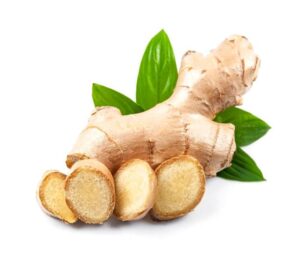 Anti-Inflammatory Powerhouse
Anti-Inflammatory Powerhouse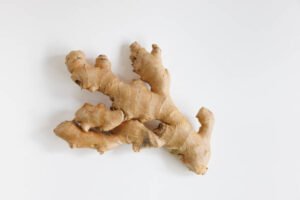 Nausea Relief
Nausea Relief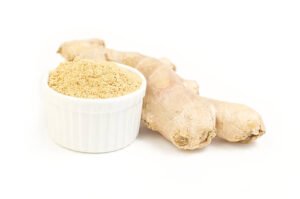 Immune System Support
Immune System Support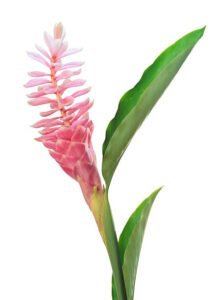 Potential Anti-Cancer Properties
Potential Anti-Cancer Properties Blood Sugar Regulation
Blood Sugar Regulation